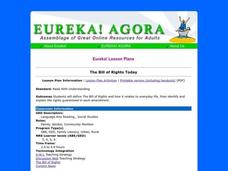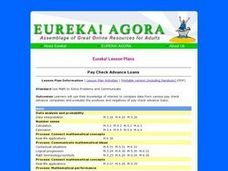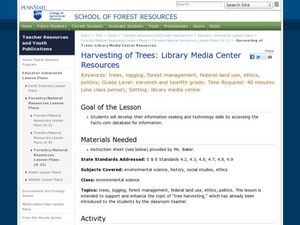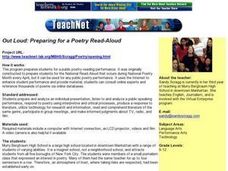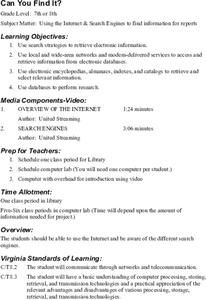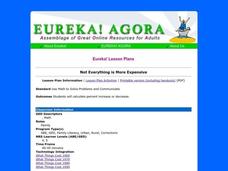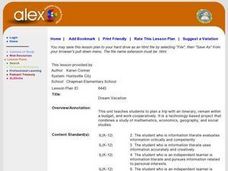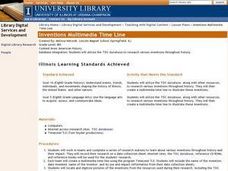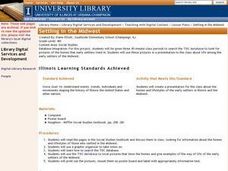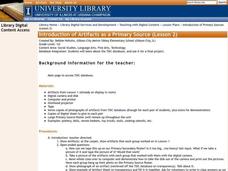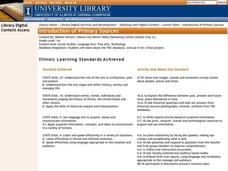Curated OER
The Bill of Rights Today
Students examine the Bill of Rights, They read the Bill of Rights and clarify the meaning of the material using different reading strategies. In groups, students brainstorm to compare and evaluate their conclusions with those of others.
Curated OER
PayCheck Advance Loans
Students discuss the role of a paycheck advance loan company. Using data given to them, they calculate interest rates on the amount of advance they receive and identify the penalties of not repaying the loan on time. They record their...
Historic New Orleans Collection
Exploring Primary Sources: Music in New Orleans
Looking for a new and exciting way to teach young historians the art of primary source analysis? Jazz up your lesson plan with a resource that asks class members to analyze photos, travel documents, and letters written by some of New...
Curated OER
Harvesting of Trees: Library Media Center Resources
Students research harvesting of trees in the United States and write a summary. In this informative lesson students state whether they agree or disagree with an article and write a summary on why.
Curated OER
Introduction to the Biotic Water Quality of a Stream
In this lesson plan, middle schoolers properly use a taxonomic key to identify benthic organisms. Students go onto collect aquatic macroinvertabrate and then ennumerate all organisms colelcted. The culminating activity is the Project...
Curated OER
Out Loud: Preparing for a Poetry Read-Aloud
Students research poetry on the Internet in preparation for a read-aloud performance. By consulting online experts and searching databases, they hone performance skills while also locating material. The lesson can be used to support...
Curated OER
The Uluburun Shipwreck Project: Interconnections through Trade in the Late Bronze Age Mediterranean World
Ninth graders examine causes and effects of the Uluburun shipwreck. In groups, they develop their own ways to categorize the artifacts found on the ship and decide on the research questions they are going to focus on. They use the...
Curated OER
Can You Find It?
Students use the Internet and search engines to research a foreign country. They use the Internet and library to further their understanding on how to use those resources.
Curated OER
The Constitution
Students use both electronic and traditional resources to research information about U.S. Constitution, answer questions pertaining to Congress and the Presidency, and design HyperStudio presentation to display answers to research...
Curated OER
Career Education
Pupils participate in a lesson that focuses on the research of a chosen career field. They gather information from a variety of resources. The information is used to compose a research paper or powerpoint presentation.
Curated OER
Researching Intermountain West Earthquakes
Students research earthquakes using the internet and newspapers. They discover the earthquake's effect on people and buildings. They report their findings to the class.
Curated OER
Mathematical Magazines
Learners use ads from magazines to create data to be measured and apply the skill of estimation. They record the percentage of magazine ads that could be separated into different categories made by students through the use of logical...
Curated OER
Not Everything Is More Expensive
Students investigate the concept of using different types of presentations to help solve mathematical problems. They research the use of illustrations to help understand data and its interpretation in a graphing format. Students also...
Curated OER
Discovering Pi/Welcome to Pi Day
Students explore pi. In this circle measurement lesson, students define and identify radius, diameter, circumference, and perimeter. Students work in groups to measure several plastic lids and record their findings. Students compare the...
Curated OER
Dream Vacation
Students research cities, states, or countries using the internet and other resources to learn about a vacation spot. They make a final presentation of their findings in forms other than a written report.
Curated OER
Western Hemisphere
Fourth graders use a database to compare countries in the western hemisphere. They describe a variety of regions in Texas and the Western Hemisphere such as political, population, and economic regions that result from patterns of human...
Curated OER
Inventions Multimedia Time Line
Eighth graders research the impact of particular inventions on various times throughout history. They compile information from the Internet and a database to create a multimedia timeline of important inventions. The program Timeliner is...
Curated OER
For the Record: Black Inventors and Inventions
Young scholars create a database with the inventions of African-Americans. They analyze and sort the data in an appropriate fashion. They use the internet to gather their information for the database.
Curated OER
Comparing Weather Conditions
Students conduct research on temperature, wind speed and weather conditions from a variety of areas. They organize their findings on worksheets and spreadsheets and discuss various examples of databases.
Curated OER
Settling in the Midwest
Fourth graders search a database for pictures of home that early Midwestern settlers lived in. They create a class presentation using the pictures.
Curated OER
Geography Grid
Fourth graders search a database to find images and scan and affix them on an 8-foot long map of the state of Illinois. They then use it as a basis for discussion.
Curated OER
I'll Trade a Ponce de Leon for a Columbus...
Third graders research the discovery of the Americas by various explorers. They create a multiedia presentation about an explorer of their choice including their motivations, obstacles, and successes. Their explorer information will be...
Curated OER
Introduction of Primary Sources
Students will use the internet to access information about artifacts to justify their use as primary sources of information. The activities can be done as a whole class or in groups. The differences between primary and secondary sources...
Curated OER
Introduction of Primary Sources
First graders examine a database to explain the use of primary source documents.


